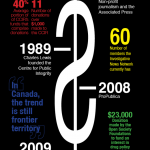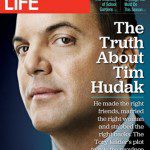Canada lags behind as online platforms help long-form journalism thrive in the United States
Reports of the death of long-form writing have been greatly exaggerated, especially south of the border, as Kindle Singles, Longform.org, Byliner and Read it Later lead a revival. So what are Canadians waiting for?
Paul Lima says he nearly doubled the profits from nine of his non-fiction books by publishing them as e-books on Amazon’s Kindle website. His feature writing how-to guides sell for two-thirds the price of their hard copy counterparts, but more people buy them. “I’m making money that I wouldn’t have otherwise with the Kindle,” he says. “I’m out there. I’m taking the risk. And I’m self-publishing.” He’s now working on his next project: a Kindle Single on how to prepare for media interviews.
Lima is one of the few Canadian journalists tackling the immense, American-dominated e-publishing business. Despite all the moans and groans about the declining industry, tech-savvy American entrepreneurs have found a way to revive long-form journalism. Newspapers and magazines are releasing longer articles on e-tablets and selling them for a couple of dollars. “You’re either with it or not,” says Lima, “If you were a buggy whip maker when cars came out, you could keep making your whips, but people aren’t going to be buying them.” So far, though, most of the action is south of the border and that means many Canadians are missing out.
Kindle Singles typically run between 5,000 and 30,000 words, making them ideal for mobile devices. Aaron Lammer, one of the founders of longform.org, a website that curates new and classic long-form articles that are “too long and too interesting to be read on a web browser,” believes, “People are a bit skittish with attempting Moby Dick on their iPad. But I could take on two or three Kindle Singles in a week.” And Singles provide journalists and writers another way to get some cash in their pockets.
Kobo, Kindle’s Canadian rival,doesn’t have an e-book category comparable to Singles. Amazon was already on its third generation of Kindles before the Kobo was even released. “You’re going to get Americans jumping into the deep end before most Canadians when it comes to this stuff,” says Lima. “Let’s hope we get some entrepreneurial Canadian companies that can set up a model for us.”
Writers who choose the Kindle Direct Publishing royalty receive 70 percent of the cost of an e-book or Single. Depending on how popular an article is, this could turn into a nice paycheque. “Once it’s out there, as long as it’s relevant, you just keep selling,” says Lima. “Then you’re making money in your sleep.”
Amazon is looking for “fresh, original, well-written and interesting stories,” according to Brittany Turner, a spokesperson for the company. But not one of Kindle Singles’s top 20 best-selling authors is Canadian. Cecil Rosner, the author of Behind the Headlines: A History of Investigative Journalism in Canada, suggests one reason may be that the decline in revenue for journalism hasn’t hit hard enough here for Canadians to turn to alternate delivery methods. But that just means writers and media outlets are missing a great opportunity. Rosner, a managing editor at CBC, notes that his network or The Globe and Mail could easily produce an investigative e-book. “There’s potential for this—just like The Guardian came out with an e-book for the News of the World scandal. If the Globe had packaged all its sponsorship scandal stories as an e-book that could have been successful.”
ProPublica, an American non-profit investigative newsroom, has already released four Kindle Singles, including The Wall Street Money Machine, which looks into the troubling downturn of the American housing market. Richard Tofel, the general manager of ProPublica says, “We’re already on a wide range of mobile devices and we’re talking to a few more book-like ones.” He adds that there’s clearly an appetite for this kind of writing, “and I don’t think the web is the best venue for it.”
Still, long-form does exist on the web. But Nate Weiner found it difficult to keep track of all the articles he wanted to read. “I just wanted a good system to store that stuff. Nothing really worked for me. I emailed myself links, left the browser open, saved tabs, but none of it ever got read.” So the 27-year-old web programmer designed Read It Later, an online service that allows people to transfer their reading lists from websites to mobile devices. It now has over 3.5 million users. “I definitely didn’t see it coming,” admits Weiner, who just moved into a new office in San Francisco and is hiring his seventh employee. “It was a tool that helped solve a problem that I later discovered a lot of people had.”
Byliner combines the best of both worlds. Once readers enter their preferences, the system suggests other articles the reader might like—much as Apple’s Genius tool does for music. John Tayman, the founder of Byliner, is the technology editor at Time. But when he was the creative director at Men’s Health, he wrote a book called The Colony; while juggling the two, he realized there was this realm of great stories that existed between books and magazine articles. Tayman started developing Byliner long before tablets even came out. “While working on this, all of these things came out and the space just exploded.” Byliner now competes with magazines and has an editorial team that assigns 75 percent of its stories. It pays writers an assignment fee, packages their stories, proofs them, edits them and then sells them as Byliner Originals, which can be read on Kindle and Kobo. But not one of Byliner’s best-selling Originals is Canadian.
There may be hope, though. Derek Finkle, the founder of the Canadian Writers Group, hopes to enter this market by the spring. “There are a lot of writers in this country who could benefit from something akin to Byliner,” he says. “And we represent a lot of these writers.” He’s already talking with potential business partners. “The number of venues for this type of journalism in Canada is undeniably shrinking,” says Finkle. “But every time I’m at an airport or a train station I’m stunned by the number of people consuming content on their tablets.”














